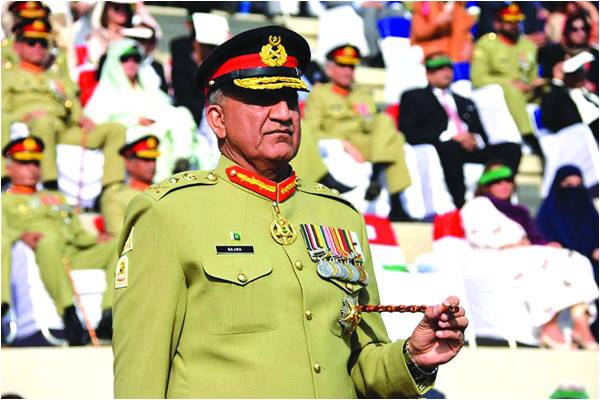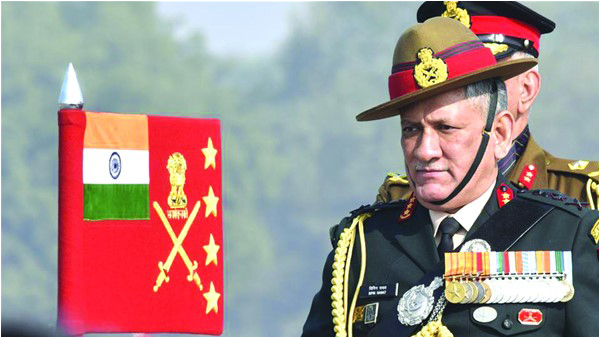
It was a pleasant surprise to hear Indian Army Chief Bipin Rawat and his Pakistani counterpart General Qamar Javed Bajwa speaking the same language and that too, on same day. For any one who is a keen observer of India-Pakistan relations, it was as if the same script was being read out in Delhi and Kakul. Masked, of course, in language suited to the discourse on both sides, the message was identical and clear.
General Rawat was speaking at the 70th Foundation Day of Jammu and Kashmir Light Infantry in Delhi on April 15 when he said guns were no solution to the problem of Kashmir and the youth would soon realise this. “The time is not far when they will be convinced that neither the forces nor the militants will be able to achieve their goal. Together, we have to find a way for peace and we will be successful in that,” Rawat said.
At the same time, General Bajwa was addressing a passing out ceremony for cadets at Pakistan Military Academy in Kakul. His words echoed Rawat’s sentiments but the tone was different.
“It is our sincere belief that the route to peaceful resolution of Pakistan-India disputes, including the core issue of Kashmir, is through comprehensive and meaningful dialogue,” he said. “While such dialogue is no favour to any party, it remains the inevitable precursor to peace across the region. Pakistan remains committed to such a dialogue, but only on the basis of sovereign equality, dignity and honour.”
Was this just a coincidence or there is some backroom work to it? Both these statements have come at a very crucial moment, given the difficult situation which has unfolded in the last few months.
Speaking of General Rawat’s statement first, it is not difficult to spot the realization that countering violence with more violence has not helped restore peace in Kashmir.
General Rawat served in Kashmir, from heading a brigade in Watlab to leading a division in Baramulla, and enjoyed rapport with people which the Indian Army prefers to call the ‘awaam’ (the public). He had a fair idea that the problem in Kashmir is not the unemployment, but the fight for political dignity.

However, it was a different General Rawat when he took over as chief of the Indian Army. He began talking as a general of an army at war with the Kashmiri people. In February 2017, he drew flak for his statement that those found obstructing counter-insurgency operations would be treated as anti-nationals. On more than one occasion, General Rawat spoke in hawkish tones while dealing with Kashmir. Most of the time, he made the Peoples Democratic Party (PDP) uncomfortable for his choice of words for the Kashmiri population. This was attributed to the policy of Bhartiya Janta Party (BJP) government in Delhi, whose discourse he was regurgitating. Over the last four years, the government in Delhi has only talked to Kashmir over the barrel of a gun and General Rawat has been doing that job through his statements.
However, a change can be seen in his April 15 speech. It is certainly a departure from his earlier posturing. Is he trying to buy peace in Kashmir after the realization that New Delhi can no longer afford to kill more civilians while targeting the militants? In 100 days, 90 people have been killed and a major challenge for government forces has been breaking the unity of militants and the civilian population. Kulgam was a classic example, where four civilians were killed while four militants managed to escape. Being ready to “sacrifice” themselves for militants is a huge cost civilians are ready to pay and it makes for an extremely difficult task for the army to handle.
On the other hand, General Bajwa’s desire for dialogue is also encouraging. The common belief that the army has the final word in Pakistan’s strategic decision-making is not out of place. Given this context, his statement comes at a time when tensions in Kashmir have reached a new peak.
Capitalising this angst would have been a natural response from Pakistan and to support the cycle of violence could have been the easier way to punish India or keep it engaged in Kashmir.
However, General Bajwa’s olive branch is something that goes against the common perception of Pakistan having a vested interest in encouraging violence in Kashmir. It also serves as a demoralising factor for militants.
Notwithstanding the fact that a strong section in the security establishment would not like to end this support, General Bajwa’s statement carries a strong message. With a weak government in power and elections due in a few months, the army chief’s assertion should not be an exercise in waste. It is a message that needs to be taken seriously by the Indian side. Political grapevine suggests that timing of these statements is just not a coincidence and some behind-the-scenes effort had led to this moment.
Unfortunately, the political environment in both countries may not be the most suited for a constructive dialogue. Pakistan is facing elections in a few months, India is due for elections early next year. The BJP is facing the heat on many fronts and its challenge is to return to power. An anti-Pakistan rhetoric has boosted its electoral journey and a dialogue at this stage may not suit the party and its government.
Even if the BJP government insists on Pakistan curbing “terrorism” first, General Bajwa’s statement cannot be ignored. If a Pakistani army chief has spoken of dialogue, it is a departure from the past. In a similar vein, General Rawat’s remarks are significant. His desire is dictated by ground realities. It is a moment of great opportunity and a move forward towards a peace process that could help end bloodshed in Kashmir.
General Rawat was speaking at the 70th Foundation Day of Jammu and Kashmir Light Infantry in Delhi on April 15 when he said guns were no solution to the problem of Kashmir and the youth would soon realise this. “The time is not far when they will be convinced that neither the forces nor the militants will be able to achieve their goal. Together, we have to find a way for peace and we will be successful in that,” Rawat said.
At the same time, General Bajwa was addressing a passing out ceremony for cadets at Pakistan Military Academy in Kakul. His words echoed Rawat’s sentiments but the tone was different.
Unfortunately, the political environment in both countries may not be the most suited for a constructive dialogue
“It is our sincere belief that the route to peaceful resolution of Pakistan-India disputes, including the core issue of Kashmir, is through comprehensive and meaningful dialogue,” he said. “While such dialogue is no favour to any party, it remains the inevitable precursor to peace across the region. Pakistan remains committed to such a dialogue, but only on the basis of sovereign equality, dignity and honour.”
Was this just a coincidence or there is some backroom work to it? Both these statements have come at a very crucial moment, given the difficult situation which has unfolded in the last few months.
Speaking of General Rawat’s statement first, it is not difficult to spot the realization that countering violence with more violence has not helped restore peace in Kashmir.
General Rawat served in Kashmir, from heading a brigade in Watlab to leading a division in Baramulla, and enjoyed rapport with people which the Indian Army prefers to call the ‘awaam’ (the public). He had a fair idea that the problem in Kashmir is not the unemployment, but the fight for political dignity.

However, it was a different General Rawat when he took over as chief of the Indian Army. He began talking as a general of an army at war with the Kashmiri people. In February 2017, he drew flak for his statement that those found obstructing counter-insurgency operations would be treated as anti-nationals. On more than one occasion, General Rawat spoke in hawkish tones while dealing with Kashmir. Most of the time, he made the Peoples Democratic Party (PDP) uncomfortable for his choice of words for the Kashmiri population. This was attributed to the policy of Bhartiya Janta Party (BJP) government in Delhi, whose discourse he was regurgitating. Over the last four years, the government in Delhi has only talked to Kashmir over the barrel of a gun and General Rawat has been doing that job through his statements.
However, a change can be seen in his April 15 speech. It is certainly a departure from his earlier posturing. Is he trying to buy peace in Kashmir after the realization that New Delhi can no longer afford to kill more civilians while targeting the militants? In 100 days, 90 people have been killed and a major challenge for government forces has been breaking the unity of militants and the civilian population. Kulgam was a classic example, where four civilians were killed while four militants managed to escape. Being ready to “sacrifice” themselves for militants is a huge cost civilians are ready to pay and it makes for an extremely difficult task for the army to handle.
On the other hand, General Bajwa’s desire for dialogue is also encouraging. The common belief that the army has the final word in Pakistan’s strategic decision-making is not out of place. Given this context, his statement comes at a time when tensions in Kashmir have reached a new peak.
Capitalising this angst would have been a natural response from Pakistan and to support the cycle of violence could have been the easier way to punish India or keep it engaged in Kashmir.
However, General Bajwa’s olive branch is something that goes against the common perception of Pakistan having a vested interest in encouraging violence in Kashmir. It also serves as a demoralising factor for militants.
Notwithstanding the fact that a strong section in the security establishment would not like to end this support, General Bajwa’s statement carries a strong message. With a weak government in power and elections due in a few months, the army chief’s assertion should not be an exercise in waste. It is a message that needs to be taken seriously by the Indian side. Political grapevine suggests that timing of these statements is just not a coincidence and some behind-the-scenes effort had led to this moment.
Unfortunately, the political environment in both countries may not be the most suited for a constructive dialogue. Pakistan is facing elections in a few months, India is due for elections early next year. The BJP is facing the heat on many fronts and its challenge is to return to power. An anti-Pakistan rhetoric has boosted its electoral journey and a dialogue at this stage may not suit the party and its government.
Even if the BJP government insists on Pakistan curbing “terrorism” first, General Bajwa’s statement cannot be ignored. If a Pakistani army chief has spoken of dialogue, it is a departure from the past. In a similar vein, General Rawat’s remarks are significant. His desire is dictated by ground realities. It is a moment of great opportunity and a move forward towards a peace process that could help end bloodshed in Kashmir.

